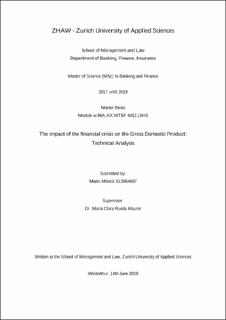Bitte benutzen Sie diese Kennung, um auf die Ressource zu verweisen:
https://doi.org/10.21256/zhaw-19571| Publikationstyp: | Thesis: Master |
| Titel: | The impact of the financial crisis on the Gross Domestic Product: Technical Analysis |
| Autor/-in: | Miletic, Mario |
| Betreuer/-in / Gutachter/-in: | Rueda Maurer, Maria Clara |
| DOI: | 10.21256/zhaw-19571 |
| Umfang: | 120 |
| Erscheinungsdatum: | 2019 |
| Verlag / Hrsg. Institution: | ZHAW Zürcher Hochschule für Angewandte Wissenschaften |
| Verlag / Hrsg. Institution: | Winterthur |
| Sprache: | Englisch |
| Fachgebiet (DDC): | 330: Wirtschaft |
| Zusammenfassung: | According to the existing literature in macroeconomics, a recession reduces output and employment in the short run; after an adjustment process, however, the output is expected to return to its long-term equilibrium and employment to come back to its natural level. Theory notwithstanding, many economists shed doubts on this idea; according to them, a recession may permanently reduce potential output by destroying capital, human capital, and knowledge. This thesis seeks to evaluate the impact of the European financial crisis on the potential output of different European countries. To answer the research question – For the so-defined “PIIGS” countries: how did the differential between potential GDP and observed GDP develop after the financial crisis of 2008? – the Box-Jenkins technique is implemented to shape an autoregressive integrated moving average model, which can forecast the development of the potential Gross Domestic Product. Additionally, an application of the Long Short-Term Memory Networks based on an Artificial Recurrent Neural Network architecture is proposed as a starting point on which to develop a more in-depth analysis. The outcomes resulting from the empirical analysis are mainly uniform across countries: a small impact is detected in the proximity of the financial crisis, which, however, expands over time. The only circumstance where it is possible to report a complete economic recovery is in Ireland. All the other economies reflect a situation in which the potential GDP forecasted is significantly above the observed GDP. |
| URI: | https://digitalcollection.zhaw.ch/handle/11475/19571 |
| Lizenz (gemäss Verlagsvertrag): | CC BY-NC-ND 4.0: Namensnennung - Nicht kommerziell - Keine Bearbeitungen 4.0 International |
| Departement: | School of Management and Law |
| Enthalten in den Sammlungen: | MSc Banking and Finance |
Dateien zu dieser Ressource:
| Datei | Beschreibung | Größe | Format | |
|---|---|---|---|---|
| Master Thesis_Miletic_Mario.pdf | 4.43 MB | Adobe PDF |  Öffnen/Anzeigen |
Zur Langanzeige
Miletic, M. (2019). The impact of the financial crisis on the Gross Domestic Product: Technical Analysis [Master’s thesis, ZHAW Zürcher Hochschule für Angewandte Wissenschaften]. https://doi.org/10.21256/zhaw-19571
Miletic, M. (2019) The impact of the financial crisis on the Gross Domestic Product: Technical Analysis. Master’s thesis. ZHAW Zürcher Hochschule für Angewandte Wissenschaften. Available at: https://doi.org/10.21256/zhaw-19571.
M. Miletic, “The impact of the financial crisis on the Gross Domestic Product: Technical Analysis,” Master’s thesis, ZHAW Zürcher Hochschule für Angewandte Wissenschaften, Winterthur, 2019. doi: 10.21256/zhaw-19571.
MILETIC, Mario, 2019. The impact of the financial crisis on the Gross Domestic Product: Technical Analysis. Master’s thesis. Winterthur: ZHAW Zürcher Hochschule für Angewandte Wissenschaften
Miletic, Mario. 2019. “The Impact of the Financial Crisis on the Gross Domestic Product: Technical Analysis.” Master’s thesis, Winterthur: ZHAW Zürcher Hochschule für Angewandte Wissenschaften. https://doi.org/10.21256/zhaw-19571.
Miletic, Mario. The Impact of the Financial Crisis on the Gross Domestic Product: Technical Analysis. ZHAW Zürcher Hochschule für Angewandte Wissenschaften, 2019, https://doi.org/10.21256/zhaw-19571.
Alle Ressourcen in diesem Repository sind urheberrechtlich geschützt, soweit nicht anderweitig angezeigt.